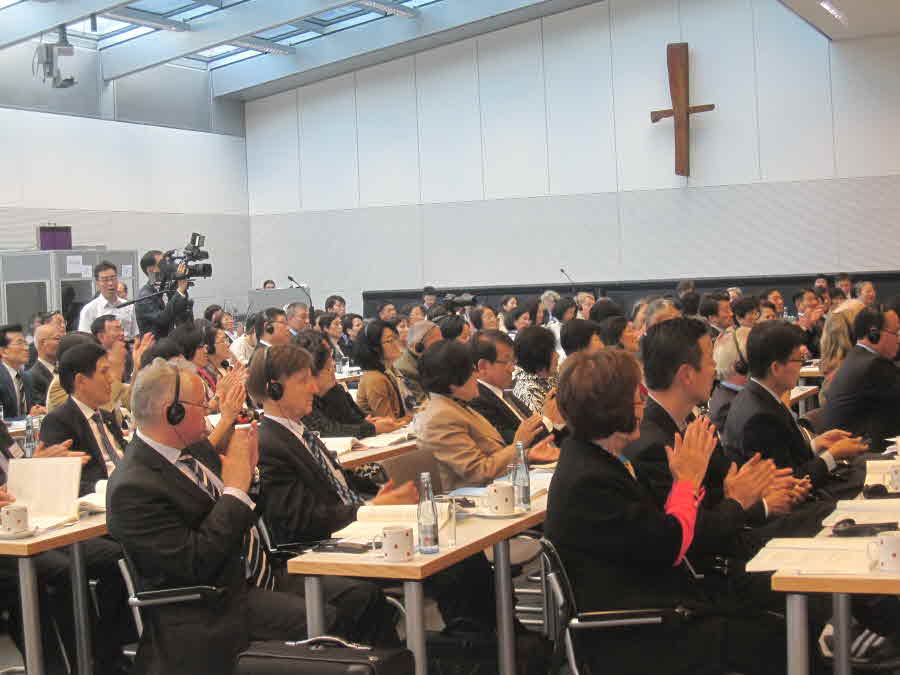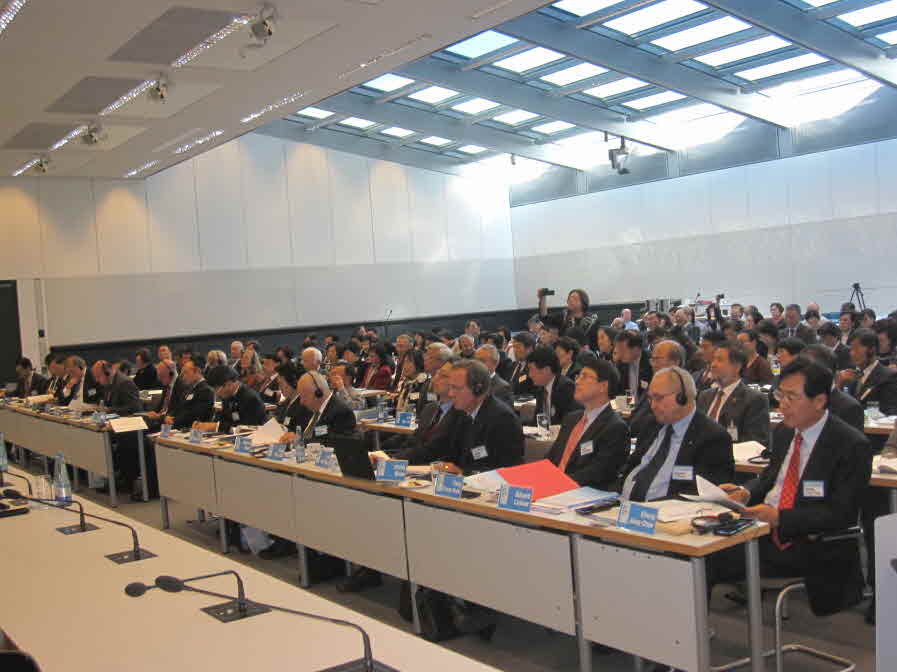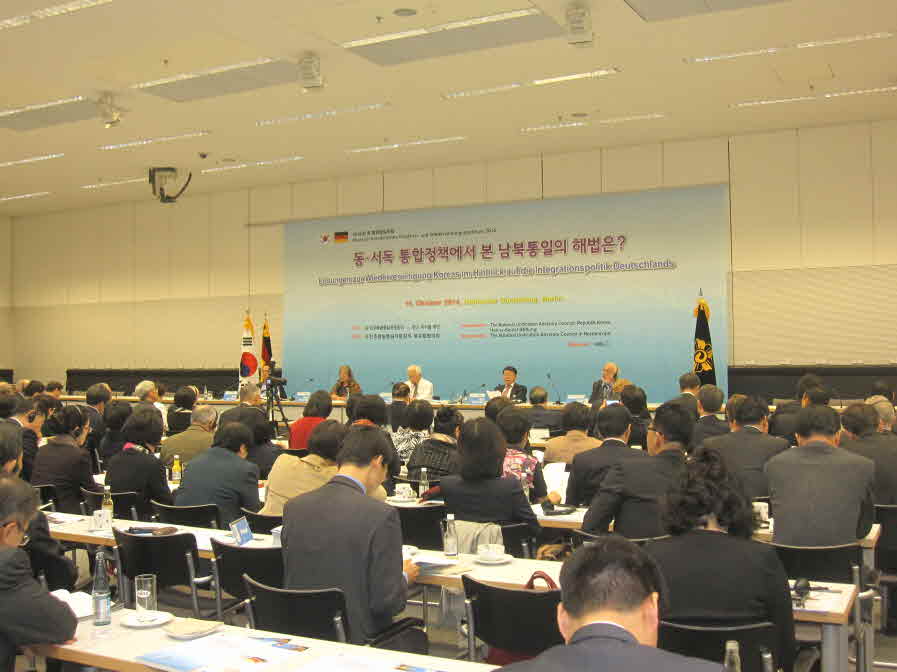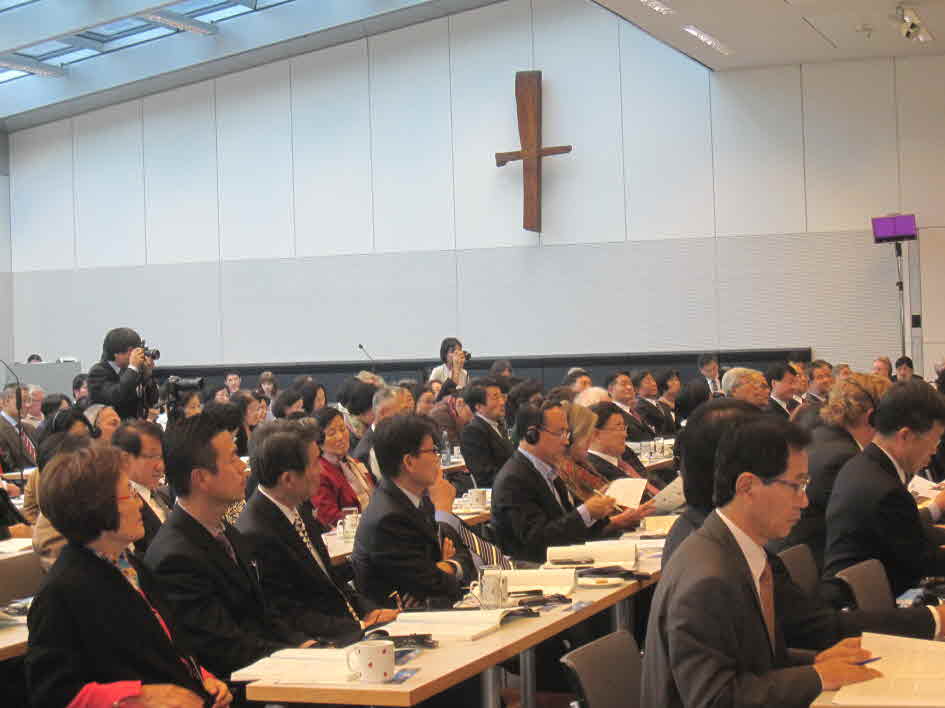"What is the solution to the unification of the two Koreas as viewed from the integrated policy of East and West Germany?"
Korea Germany Peaceful Unification Forum Held in Berlin on Oct. 15.
Solving the Human Rights Issue of North Korea Will be the Foundation for the Unification of the Two Koreas
On the occasion of the 25th anniversary of the tearing down of Berlin Wall, the「2014 Korea Germany Peaceful Unification Forum」was held on Oct. 15 in Berlin, Germany to seek the solution to the unification of the Korean peninsula.
The forum was held at the German Federal Congress (Deutsche Bundestag), where 18 experts from the two countries discussed the issue under the theme 『What is the solution to the unification of the two Koreas as viewed from the integrated policy of East and West Germany?』△ policy of building the unification foundation of West Germany and △ human rights policy of West Germany toward East Germany.
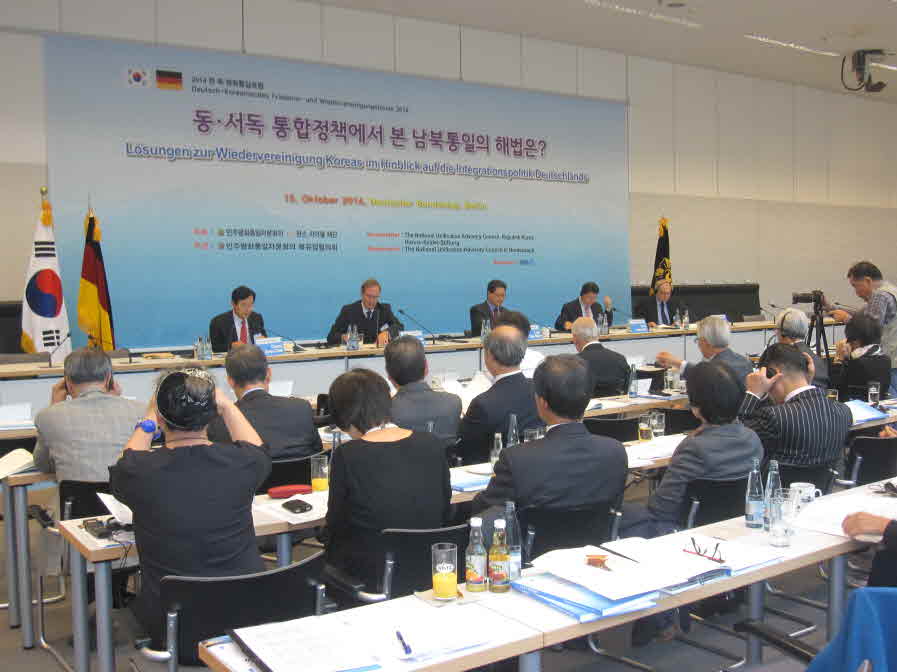
2014 Korea Germany Peaceful Unification Forum
At least 200 people including council members in Germany, Korean society leaders in the country, Korean students, figures from academic circles in Germany, government officials, and politicians attended the forum.
The forum was held from 2 to 7 in the afternoon as follows: △ Greetings from Norbert Lammert, speaker of the Germany Federal Congress △ Greetings from Harmmut Koschyk, chairman of the Germany Korea Friendship Association of Congress Members △ Opening Address by Choi Wol-ah, chairperson of the Northern Europe council, and Bernhard Seliger, representative of the Hans Seidel Foundation Korea Office △Congratulatory messages from Kim Jae-sin, South Korean Ambassador to Germany, and Nam Kyeong-pil, Governor of Gyeonggi Province of South Korea △ Keynote address by Hyun Kyung-dae, executive vice chairperson of NUAC, and Michael Geier, former German ambassador to Korea.
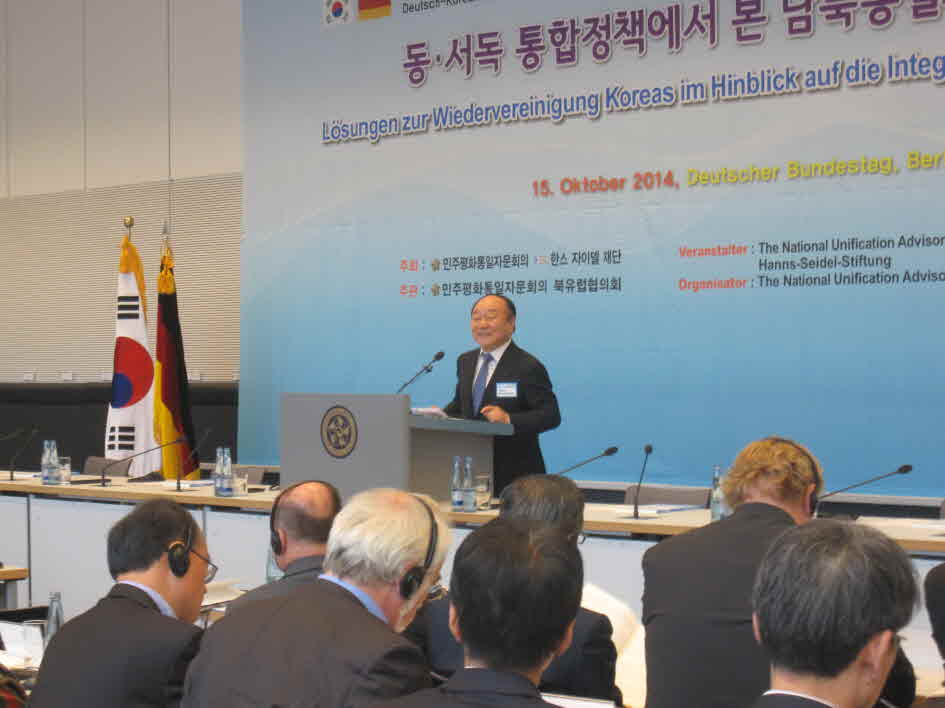
Hyun Kyung-dae, executive vice chairperson of NUAC
In his keynote address on "Unification of Germany is the victory of human rights. Unification of the two Koreas is the unification of human rights,"
Hyun said that solving the human rights problem of North Korea can be the foundation for the unification of the Korean peninsula.
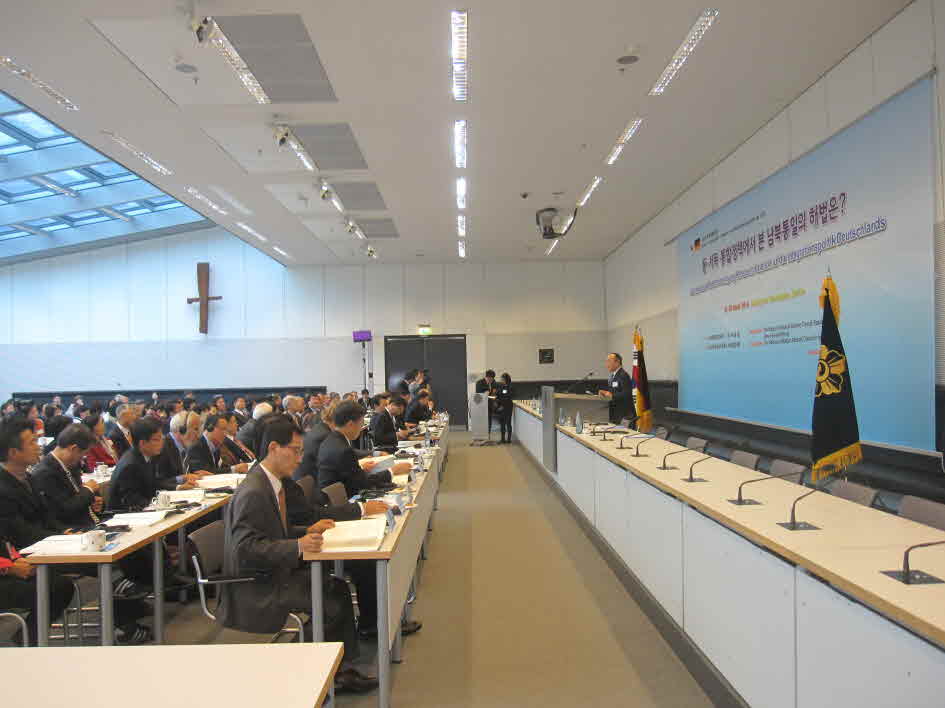
yun Kyung-dae, executive vice chairperson of NUAC
"Since President Park mentioned the human rights issue at the UN general assembly last Sep. 24, the viewpoint and approach with regard to the human rights problem of North Korea have been changing. Korea started to practice the lesson obtained from the unification of the two Germanies," he said.
Quoting the survey (reported by the Chosun Ilbo daily news) that 95% of North Korean residents in China answered that unification is very much required, he noted that North Koreans are very much eager for freedom and national unification. "Just as the unification of the two Germanies could be achieved by the wish of the Eastern German people for freedom and prosperity, the desire of the North Korean people will be the decisive power for achieving unification at a decisive time," he explained.
According to Norbert Lammert, Speaker of the Congress of Federal Germany, no standardized solution exists for national unification; therefore, open scenario for unification is required since many unexpected problems will definitely arise, he added.
According to Norbert Lammert, Speaker of the Congress of Federal Germany, no standardized solution exists for national unification; therefore, open scenario for unification is required since many unexpected problems will definitely arise, he added.
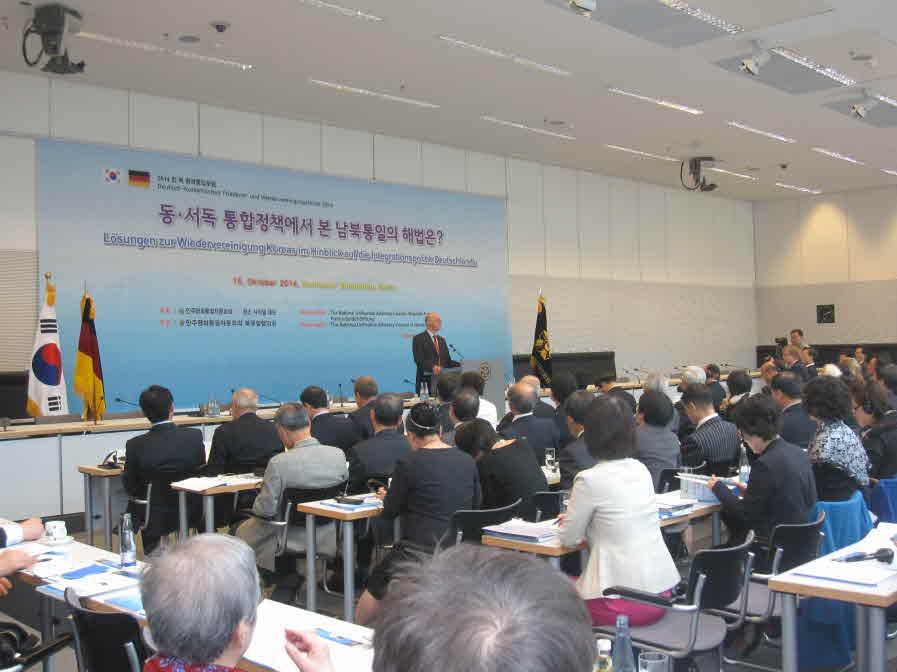
Norbert Lammert, Speaker of the Congress of Federal Germany
“We cannot say if the unification of Germany is completed or, as a matter of fact, if it can be completed. Change of Germany was possible in the range of change of Europe through mutual influence. It is important to make the international situation recognize the need for unification.
As we experienced in East Germany, we should remember that dictatorship will surely fall in time," he said.
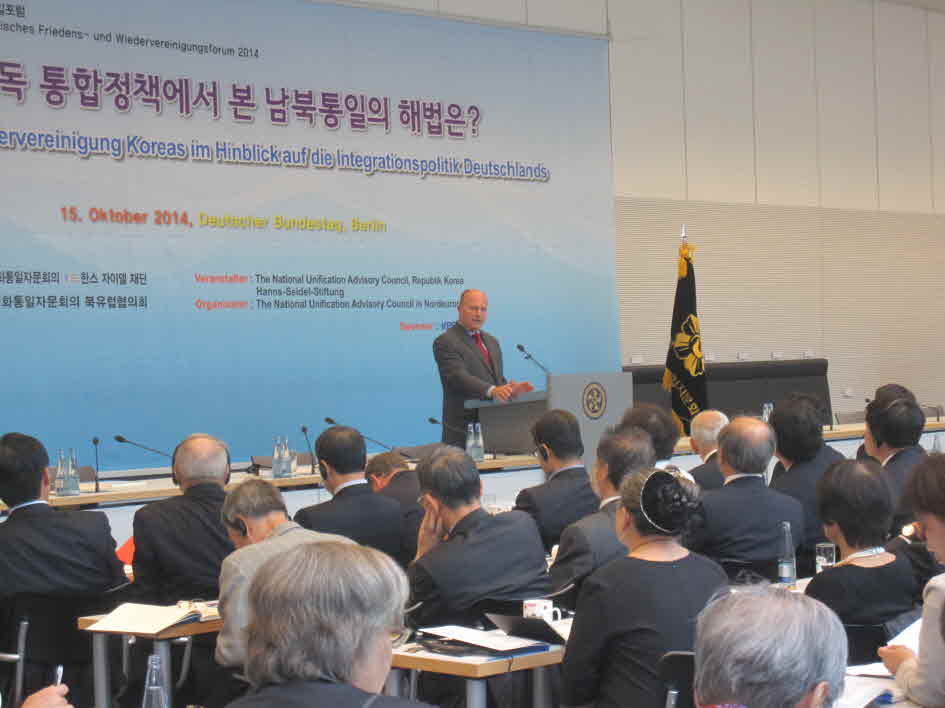
Harmmut Koschyk, Chairman of the Germany Korea Friendship Association of Congress Members
Harmmut Koschyk, Chairman of the Germany Korea Friendship Association of Congress Members, said in his welcoming speech that “Koreans need not be disappointed with the slow progress toward national unification but should be more active in the areas of politics and society to understand the real situation of North Koreans and enhance their understanding of them. Koreans need to prepare for unification without losing hope and courage since such gigantic challenge as national unification is difficult to achieve overnight and without confidence.”
The opening speech was delivered by Choi Wol-ah, Chairperson of the Northern Europe Council of NUAC, and Bernhard Seliger, Representative of the Hans Seidel Foundation Korea Office as the joint organizers of the forum.
"Just as Germany could achieve peaceful unification by the strong will of the people five decades after the division, the unification of the two Koreas can be realized if we prepare ourselves for the unification with the vision that we can do it. Today's forum can be said to be part of such preparation," Choi said.
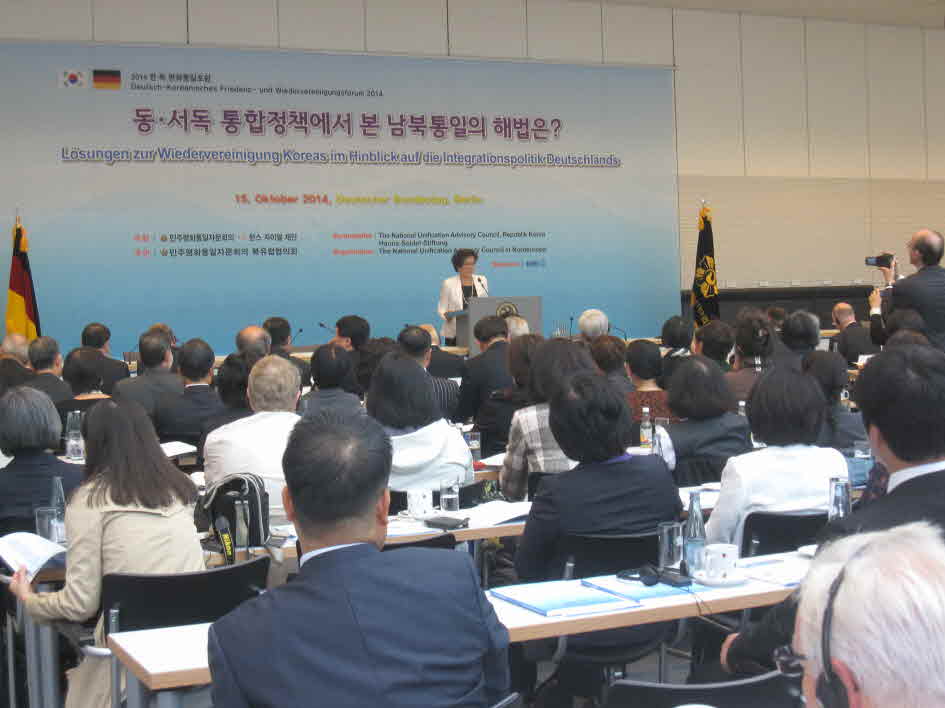
Choi Wol-ah, Chairperson of the Northern Europe Council of NUAC
According to Bernhard Seliger, the unification of Germany encourages Koreans to proceed with unification with confidence in spite of the various difficulties while pursuing it; since it is meaningful to the Germans as well, Germany will support the reconciliation of the two Koreas, he added.
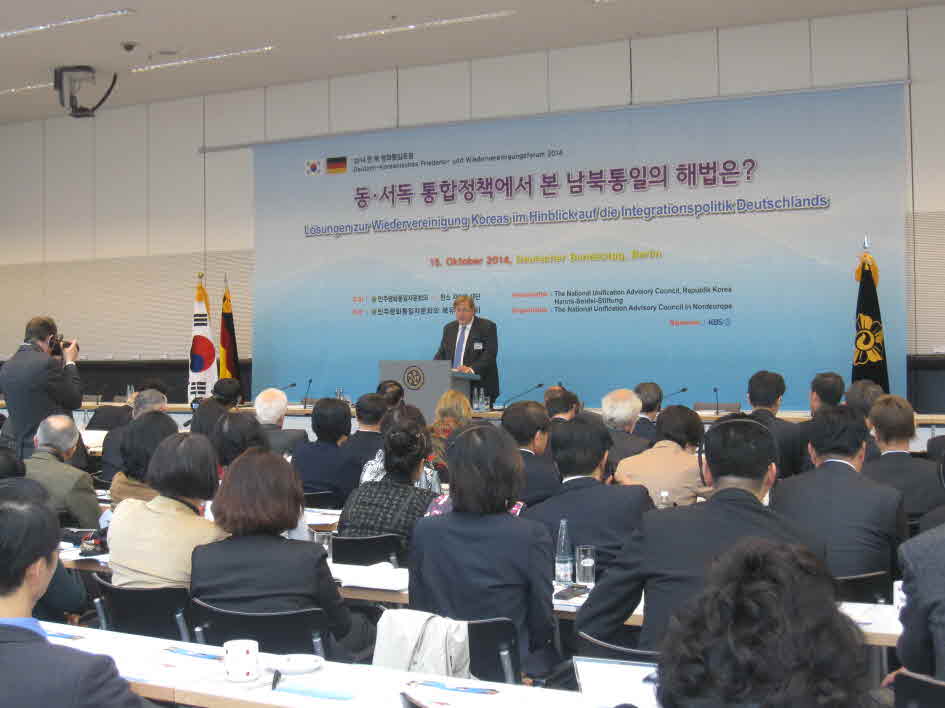
Bernhard Seliger, Representative of Hans Seidel Foundation Korea Office
"A well-prepared unification is a blessing. If we could learn from the experience and wisdom of Germany regarding unification on this occasion of holding a meaningful forum, we can prepare ourselves better for unification," said Kim Jae-sin, South Korean Ambassador to Germany.
Nam Kyeong-pil, Governor of Gyeonggi Province of South Korea, emphasized that the government policy for national unification should be promoted considering the future of a unified Korea and suggested the following: △ Prepare for unification realistically in the era of unification △ Inter-Korean policy should be established such that the North Korean regime and its residents are separated △ Provide an integrated political system for national unification.
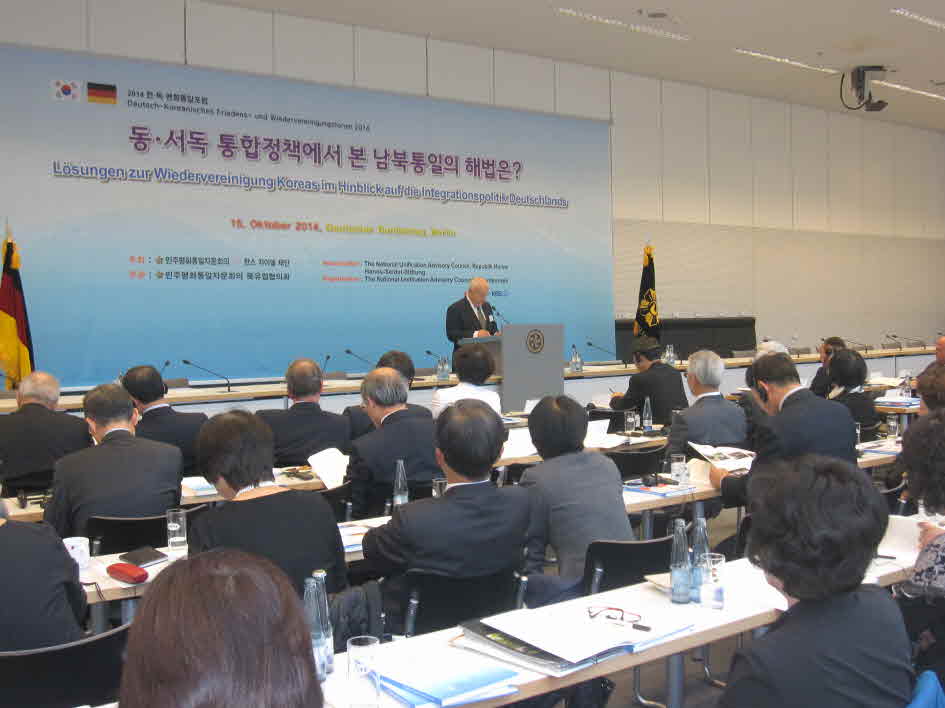
Michael Geier, former German ambassador to Korea
Michael Geier, former German ambassador to Korea, explained the progress of the nuke issue of North Korea and asked the countries of 6-party talks to be more active in solving the issue.
Discussion and debate followed the opening ceremony.
'first session: West German government policy to build the foundation for unification and implication'
first session: West German government policy to build the foundation for unification and implication.
Lee Dal-gon, former Minister of Security and Public Administration of South Korea, presided over the first session, themed "West German government policy to build the foundation for unification and implication." Presentations were given by Prof. Ulrich Blum of Wittenberg Univ. and Yang Chang-seok, auditor of the Gaeseong Industrial District Management Committee, with Eduart Lindner, former Deputy Minister of Home Affairs of Germany and Prof. Jeong Jung-jae of Chungbuk Univ serving as panelists.
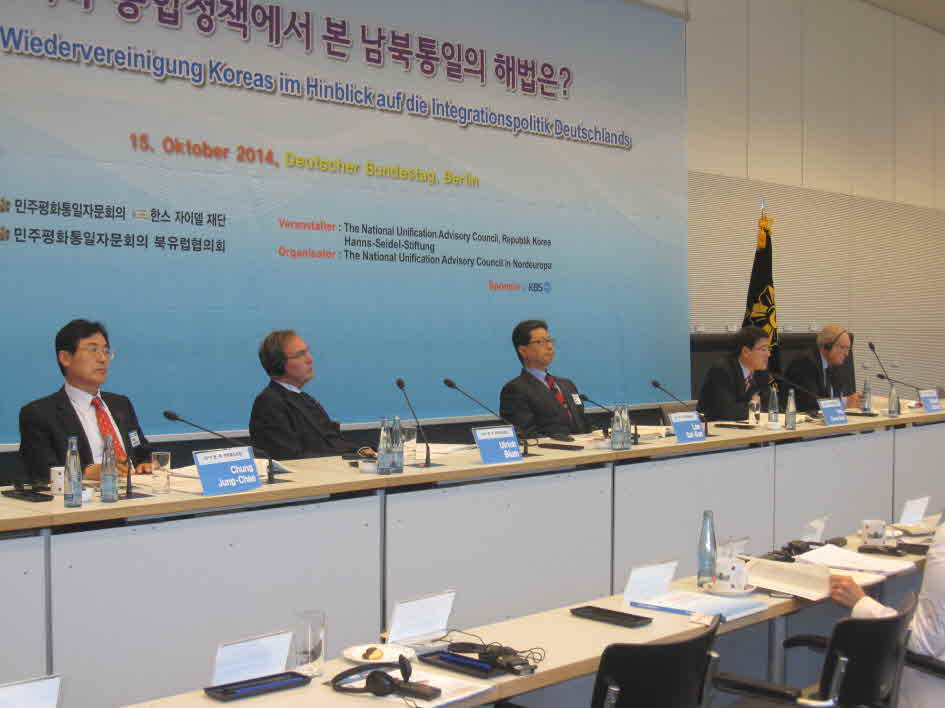
first session panelists (from left to right): Prof. Jeong Jung-jae of Chungbuk Univ., Prof. Ulrich Blum of Wittenberg Univ. Lee Dal-gon, former Minister of Security and Public Administration of South Korea, Yang Chang-seok, auditor of the Gaeseong Industrial District Management Committee, Eduart Lindner, former Deputy Minister of Home Affairs of Germany
“The unification policy should differentiate the stages of preparation, understanding of the current status, and implementation; a strategic course should be secured through such stages. Subjects concerned will be △providing a unification scenario △ building good unification governance △ evaluating the policy continuously and developing political activities interactively," Prof. Ulrich Blum said.
Auditor Yang Chang-seok explained the elements for realizing the peaceful unification of Germany: △ fall of the dictatorship of East Germany △ international environment of dismantling the cold war △ economic and diplomatic capability of West Germany and core of building the foundation of the unification policy △ West German policy that lays emphasis on the West and strong support of the USA △ promoting efficient policy of exchange and cooperation based on a principle △ maintaining a sustainable communication channel with East Germany and △ adhering to the principle of self-determination by the people.
Eduart Lindner, former deputy minister, explained important historical facts for the past 25 years after the unification of Germany. "The infrastructures of each village and city in the former East German areas were improved, which can hardly be imagined back in 1989, and the actual living standard of West Germany was not adversely affected; the German government's revenue is now historically the highest, and the export volume of the unified Germany is at an all-time high. The Unified Germany is a veritable story of success," he added.
Prof. Jeong Jung-jae of Chungbuk Univ. analyzed the elements of peaceful unification of Germany as follows: △ Firm and strong will of West German people toward peaceful unification △ Internal desire of the West German people for system change and △ Mature external environment surrounding the unification of Germany. Such conditions for unification are satisfied in part in the Korean peninsula, but they have not yet sufficiently matured, he added.
second session: Human rights policy of West Germany against East Germany and its implication on the unification of the Korean peninsula
The second session, themed “Human rights policy of West Germany against East Germany and its implication on the unification of Korean peninsula,“ was hosted by Honorary Prof. Park Seong-jo of the Free University of Berlin. Seo Byeong-chul, former director of Unification Research of South Korea, Anna Kaminsky, secretary general of the Federal Foundation for the Reappraisal of Socialist Unity Party of Former East Germany, Choi Bo-seon, senior technical expert of the Foreign Affairs, Trade and Unification Committee of Saenuri Party of South Korea, and Karl Brenke, researcher of the German Institute for Economic Research, participated as panelists.
In other words, the extent of Korean people’s formation of bond of sympathy for national unification has not reached the level that will enable gathering internal power to achieve peaceful unification with North Korea. Although surrounding countries including China move in a positive direction with regard to unifying the two Koreas, closer cooperation with them is required.
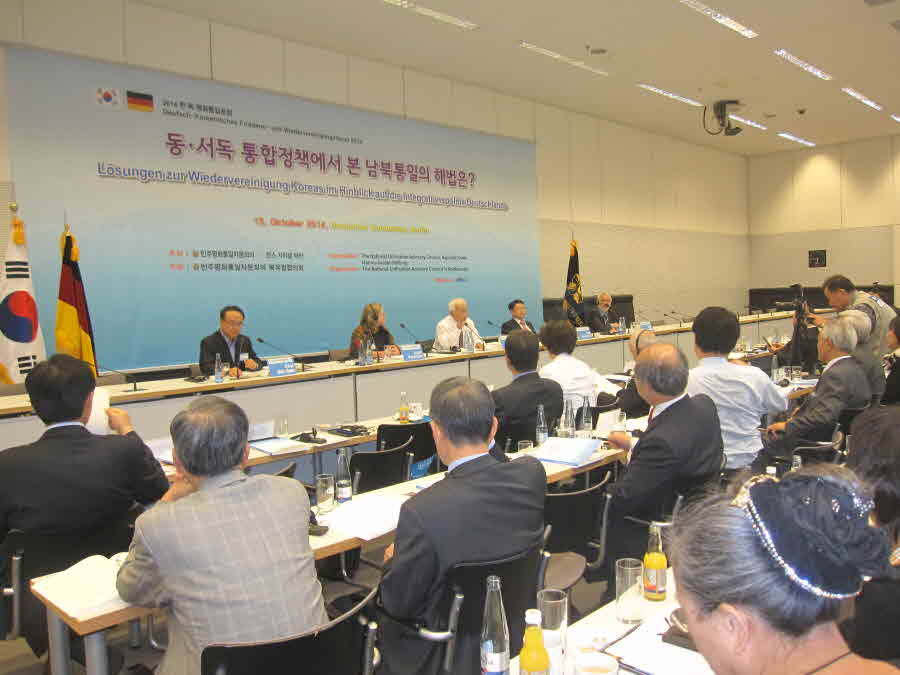
Second session panelists (from left to right): Choi Bo-seon, senior technical expert, Anna Kaminsky, Honorary Prof. Park Seong-jo, Seo Byeong-chul, and Karl Brenke
Seo Byung-chul analyzed the human rights policy of West Germany against East Germany in detail. “Raising the issue of human rights in North Korea needs skillful strategy and theoretical grounds as well as bold driving force. South Korea needs to express positive, sustainable interest in human rights just like the former West Germany and establish and support a careful strategy to improve the living standard of the North Korean people," he stressed.
He suggested the following: △ Improving the recognition of the North Korean people on South Korea through the reunion of separated families from South and North △ Close cooperation with international societies △ Proposing massive benefits corresponding to the improvement of human rights situation in North Korea.
According to Anna Kaminsky, secretary general, West German media reported the human rights situation of the East German people, who were suppressed and persecuted by the former East Germany, and protected them, approaching the journalists and civic groups of East Germany. "For their part, the East German people approached the western world through radio, encouraged that they had not been forgotten,” she added.
“The human right policies of West Germany against East Germany were △Ceaseless efforts of West Germany to secure efficiency of its human rights policy △ Irrespective of the changing relations between the two Germanies, West Germany kept on upholding and emphasizing the universality of human rights by criticizing the human rights situation in East Germany in a normative, principal manner △ Consistent policy towards East Germany was maintained both by the right and left wings of the political parties of the then West Germany," Senior expert Choi Bo-seon said.
Karl Brenke, researcher of the German Economy Institute, said that a means of exercising influence is required for the human rights policy to be effective, and one of such means can be “Interaction through exchange.“ East and West Germany continued exchanging goods, opinion, political views, culture, and funds amid the situation of division, which resulted in alleviating the tension between the countries and preventing the human rights situation of East Germany from worsening, he added.
The forum was regarded as a good opportunity to find lots of indications for the unification preparation of the Korean peninsula including the human rights policy in detail along with the political efforts for unification by reviewing the unification of the two Germanies.










